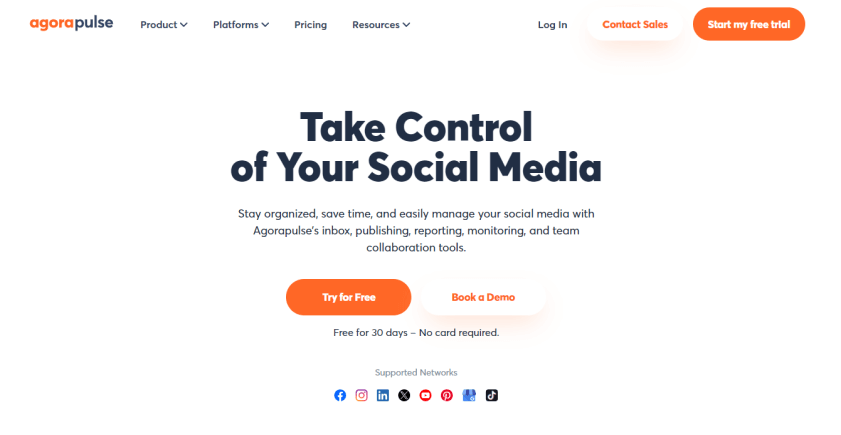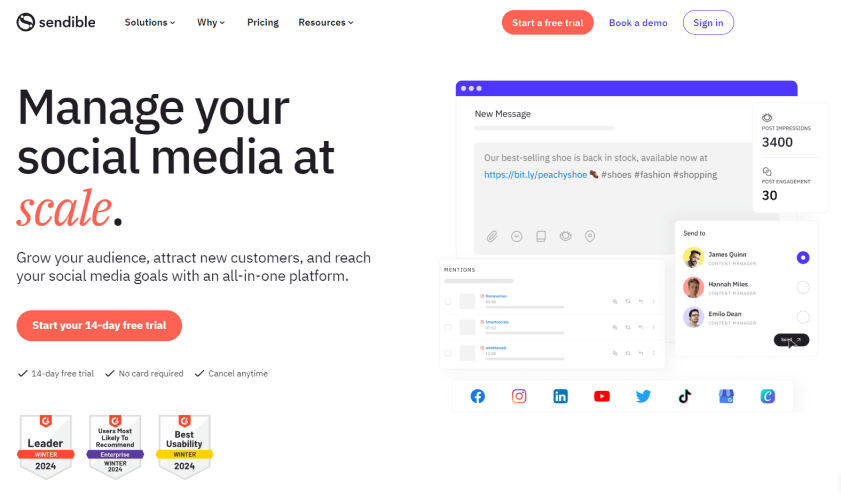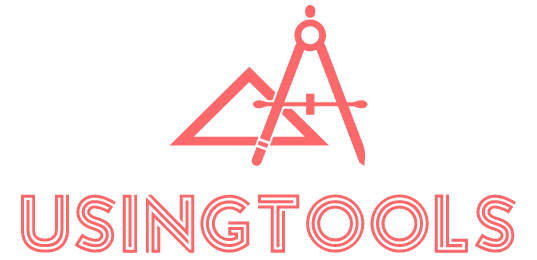Social media management tools are software applications designed to help individuals, businesses, and organizations streamline and optimize their social media presence across multiple platforms. These tools provide a centralized hub for managing various social media activities, such as scheduling posts, monitoring conversations, analyzing performance metrics, and collaborating with team members.
The primary purpose of social media management tools is to improve efficiency, consistency, and productivity in social media marketing and engagement efforts. By consolidating multiple tasks and processes into a single interface, these tools enable users to save time, maintain a cohesive brand voice, and effectively manage their online reputation.
Common features of social media management tools include:
- Social Media Publishing and Scheduling: These tools allow users to create, schedule, and publish content across various social media platforms from a single dashboard. This feature enables consistent posting and ensures that content is delivered at optimal times for maximum engagement.
- Social Media Monitoring and Engagement: Social media management tools provide features for monitoring brand mentions, hashtags, and conversations across multiple platforms. Users can respond to comments, messages, and mentions in real-time, fostering better customer engagement and community management.
- Social Media Analytics and Reporting: These tools offer comprehensive analytics and reporting capabilities, providing insights into audience demographics, engagement rates, reach, and overall performance. This data helps users understand what content resonates with their audience and informs future social media strategies.
- Team Collaboration and Workflow Management: Many social media management tools facilitate collaboration among team members by allowing for content approval workflows, task assignments, and seamless communication. This feature is particularly useful for larger organizations with multiple stakeholders involved in social media management.
- Content Curation and Sourcing: Some tools include features for discovering, curating, and sharing relevant content from various sources, such as news websites, blogs, or social media feeds. This helps users maintain a consistent content pipeline and share valuable information with their audience.
- Social Media Advertising and Promotion: Advanced social media management tools often integrate with advertising platforms, enabling users to create, manage, and optimize social media ad campaigns directly from the tool.
Table of Contents
Why Use Social Media Management Tools?
Social media has become an integral part of modern marketing and communication strategies. However, managing multiple social media accounts across various platforms can be a daunting task, especially for businesses and individuals with a significant online presence. This is where social media management tools come into play, offering a range of benefits that streamline and optimize social media operations.
Increased Efficiency: Social media management tools allow users to schedule posts in advance, ensuring a consistent and timely presence across multiple platforms. This eliminates the need for manual posting, saving valuable time and resources. With features like content calendars and bulk scheduling, users can plan and organize their social media content strategically, freeing up time for other tasks.
Consistency and Branding: Maintaining a consistent brand voice and visual identity across various social media platforms is crucial for building a strong online presence. Social media management tools provide features like content libraries, templates, and approval workflows, ensuring that all posts adhere to brand guidelines and messaging. This consistency helps reinforce brand recognition and credibility.
Monitoring and Engagement: Effective social media management involves more than just posting content; it also requires monitoring and engaging with your audience. Social media management tools offer features like social listening, mention tracking, and sentiment analysis, allowing users to stay on top of conversations, respond to comments and queries promptly, and identify potential issues or opportunities.
Analytics and Reporting: Understanding the performance of your social media efforts is essential for making data-driven decisions and optimizing your strategies. Social media management tools provide robust analytics and reporting capabilities, offering insights into metrics such as reach, engagement, click-through rates, and audience demographics. This valuable data empowers users to measure the success of their campaigns, identify top-performing content, and make informed decisions about future strategies.
By leveraging social media management tools, businesses and individuals can streamline their social media operations, maintain a consistent brand presence, engage with their audience effectively, and gain valuable insights into their performance. These tools not only save time and effort but also contribute to the overall success of social media marketing and communication efforts.
Popular Social Media Management Tools
Social media management tools come in various forms, catering to different business needs and budgets. Here’s an overview of some of the most popular options and their key features:
Buffer: A user-friendly tool that allows you to schedule posts across multiple social media platforms, including Facebook, Twitter, LinkedIn, Instagram, and Pinterest. It offers basic analytics, browser extensions, and integrations with various apps. Pricing starts at $0 for individuals and $6/month for teams.

Hootsuite: A comprehensive platform that enables scheduling, monitoring, engagement, and analytics for numerous social networks. It provides team collaboration features, custom analytics reports, and integrations with various apps and services. Pricing starts at $49/month for professionals.

Sprout Social: Designed for agencies and larger businesses, Sprout Social offers robust publishing, engagement, analytics, and team collaboration capabilities. It also includes social listening, competitive analysis, and customer relationship management (CRM) integrations. Pricing starts at $99/month.
Agorapulse: A user-friendly tool that combines social media management, monitoring, and reporting in a single platform. It offers features like social inbox, content calendar, and team collaboration tools. Pricing starts at $79/month for agencies and businesses.

Later: A visual-first platform primarily focused on Instagram scheduling and analytics. It also supports other networks like Facebook, Twitter, and Pinterest. Later offers media library management, hashtag suggestions, and influencer marketing tools. Pricing starts at $12.50/month for individuals.
Sendible: A comprehensive solution for agencies and businesses, offering publishing, monitoring, engagement, and reporting capabilities across multiple social networks. It includes team collaboration tools, content libraries, and integrations with various apps and services. Pricing starts at $29/month.

Many of these tools offer free trials or limited free plans, allowing you to test their features before committing to a paid subscription. Additionally, some tools may offer discounts for annual billing or non-profit organizations.
Choosing the Right Tool
Selecting the appropriate social media management tool is crucial for maximizing efficiency and achieving your desired results. Several factors should be considered when evaluating the available options:
Goals and Objectives: Clearly define your goals, whether it’s increasing brand awareness, driving website traffic, generating leads, or enhancing customer engagement. Different tools may excel in specific areas, so aligning your tool with your objectives is essential.
Social Media Platforms: Assess which social media platforms are most relevant to your target audience and business. Some tools may offer better integration and features for specific platforms, such as Instagram, Twitter, or LinkedIn.
Team Size and Structure: Consider the size of your team and their roles. Tools with robust collaboration features, user permissions, and approval workflows can streamline processes for larger teams, while smaller teams may prioritize simplicity and ease of use.
Budget: Social media management tools can range from free or freemium options to enterprise-level solutions with advanced features and higher price tags. Evaluate your budget and ensure the tool’s pricing aligns with your financial capabilities and provides value for the investment.
Features and Functionality: Evaluate the features offered by each tool and prioritize those that align with your needs. Common features include scheduling, publishing, monitoring, analytics, content curation, and team collaboration.
Integrations: Assess whether the tool integrates seamlessly with other software or platforms you currently use, such as customer relationship management (CRM) systems, content management systems (CMS), or e-commerce platforms. Seamless integrations can streamline workflows and enhance data sharing.
User Experience and Support: Consider the tool’s user interface, ease of use, and the availability of training resources or customer support. A user-friendly tool with comprehensive documentation and responsive support can facilitate adoption and ongoing success.
By carefully evaluating these factors, you can select a social media management tool that aligns with your specific requirements, enhances your team’s productivity, and ultimately contributes to the success of your social media efforts.
Scheduling and Publishing
Scheduling and publishing are among the core functionalities of social media management tools. These tools allow you to plan, schedule, and automatically publish content across multiple social media platforms from a centralized dashboard. This streamlined approach saves time and ensures a consistent posting schedule, which is crucial for maintaining an active online presence and engaging your audience effectively.
One of the key features is the ability to create and manage content calendars. Content calendars provide a visual representation of your planned posts, allowing you to map out your social media strategy in advance. You can schedule posts for specific dates and times, ensuring that your content goes live at the optimal times for maximum visibility and engagement.
Social media management tools also offer automation capabilities, which can further simplify the publishing process. With automation, you can set up recurring posts or campaigns, ensuring that your content is consistently shared without the need for manual intervention. This feature is particularly useful for evergreen content, promotional campaigns, or recurring events.
Advanced scheduling options allow you to tailor your posting schedule to specific time zones, ensuring that your content reaches audiences around the globe at the most suitable times. Additionally, some tools offer the ability to schedule posts with variations, such as different captions or visuals, to test and optimize your content for better engagement.
Overall, the scheduling and publishing features of social media management tools streamline your content creation and distribution processes, enabling you to maintain a consistent and strategic presence across multiple platforms while saving time and effort.
Monitoring and Engagement
Social media monitoring and engagement are crucial aspects of effective social media management. These tools allow you to track mentions of your brand, products, or relevant keywords across multiple social networks. By monitoring conversations in real-time, you can quickly identify and respond to questions, complaints, or praise from your audience.
Monitoring tools typically include features like keyword tracking, sentiment analysis, and influencer identification. This enables you to stay on top of relevant conversations, gauge public opinion, and identify influential voices in your industry. Prompt responses and engagement can help build strong relationships with your audience, address concerns before they escalate, and capitalize on positive mentions to amplify your brand’s reach.
Engagement features within social media management tools streamline the process of responding to comments, direct messages, and mentions across various platforms. Instead of juggling multiple social media accounts, you can manage all your interactions from a centralized inbox. This ensures no comments or messages slip through the cracks and allows for efficient collaboration among team members.
Advanced tools may offer automated moderation, enabling you to filter out spam, profanity, or irrelevant messages, while prioritizing genuine interactions. Additionally, some tools provide pre-defined response templates or suggest relevant content to share, saving time and ensuring consistent communication across your social channels.
Analytics and Reporting
Social media management tools offer robust analytics and reporting features that enable businesses and individuals to track the performance of their social media campaigns across multiple platforms. These tools provide detailed insights into various metrics, such as reach, engagement, clicks, impressions, and conversions, allowing users to measure the impact of their social media efforts.
One of the key advantages of using analytics and reporting tools is the ability to monitor and analyze real-time data. Users can track the performance of individual posts, campaigns, or overall social media presence, and make data-driven decisions to optimize their strategies. These tools often provide customizable dashboards and visualizations, making it easier to identify trends, patterns, and areas for improvement.
In addition to tracking performance metrics, social media management tools also offer reporting capabilities. Users can generate comprehensive reports that consolidate data from multiple social media platforms, enabling them to present insights and metrics to stakeholders, clients, or team members. These reports can be customized to include specific metrics, date ranges, and visual representations, ensuring that the information is presented in a clear and concise manner.
Furthermore, these tools often integrate with other marketing and analytics platforms, allowing users to combine social media data with data from other channels, such as email marketing, website analytics, or customer relationship management (CRM) systems. This integration provides a holistic view of the overall marketing efforts and enables users to understand the impact of social media on broader business objectives.
By leveraging the analytics and reporting features of social media management tools, businesses and individuals can make informed decisions, optimize their strategies, and demonstrate the value of their social media efforts to stakeholders and clients.
Team Collaboration and Workflow
Social media management tools play a crucial role in facilitating collaboration and streamlining workflows for teams and agencies managing multiple social media accounts. These tools offer features that enable seamless communication, task assignment, and approval processes, ensuring efficient and coordinated social media operations.
One of the key benefits of these tools is the ability to assign tasks to team members or clients. This feature allows for clear delegation of responsibilities, such as creating content, scheduling posts, or responding to comments and messages. Team leaders or account managers can assign tasks with specific deadlines, ensuring that work is distributed evenly and completed on time.
Approval processes are another essential aspect of team collaboration in social media management tools. Before publishing content or responding to sensitive inquiries, team members can submit their work for review and approval by supervisors or clients. This ensures consistency, adherence to brand guidelines, and maintains quality control across all social media channels.
Client management is also a significant feature offered by many social media management tools. Agencies or businesses working with multiple clients can create separate workspaces or projects, allowing for organized collaboration and communication with each client. This includes sharing content calendars, analytics reports, and facilitating feedback and approvals, ensuring transparency and seamless collaboration throughout the entire process.
Additionally, these tools often incorporate messaging and commenting systems, enabling team members to discuss ideas, provide feedback, and resolve any issues or conflicts that may arise during the content creation or management process. This real-time communication fosters a collaborative environment and promotes efficient decision-making.
Overall, social media management tools streamline team collaboration and workflow by providing a centralized platform for task assignment, approval processes, client management, and communication. These features empower teams to work cohesively, maintain consistency, and deliver high-quality social media content and engagement across multiple channels and clients.
Content Curation and Sourcing
Content curation and sourcing are essential aspects of social media management. With the vast amount of content available online, it can be challenging to consistently create fresh and engaging posts. Social media management tools offer features to help you discover, curate, and share relevant content with your audience.
These tools often provide content suggestion engines that analyze your industry, target audience, and previous successful posts to recommend trending articles, videos, or social media updates that align with your brand’s interests. By leveraging these suggestions, you can quickly identify and share valuable content without spending hours scouring the internet.
Additionally, many social media management tools allow you to set up content streams or feeds based on specific keywords, hashtags, or sources. These streams aggregate relevant content from various online sources, making it easier for you to curate and share the most pertinent information with your followers.
Some tools even offer content curation features that enable you to collect and organize content from multiple sources into a centralized library or content calendar. This streamlines the process of scheduling and publishing curated content alongside your original posts, ensuring a consistent and diverse content mix.
By leveraging content curation and sourcing capabilities, social media managers can save time, stay up-to-date with industry trends, and provide their audience with a steady stream of valuable and engaging content, fostering increased engagement and brand loyalty.
Integrations and Ecosystem
Social media management tools have evolved to become powerful platforms that integrate with a wide range of other tools and services. This ecosystem of integrations allows businesses to streamline their workflows, automate processes, and leverage data from various sources.
Many social media management tools offer integrations with popular marketing automation platforms, customer relationship management (CRM) systems, and email marketing tools. These integrations enable seamless data sharing and synchronization, ensuring that customer interactions and data are consistent across multiple touchpoints.
Additionally, social media management tools often integrate with content creation and curation tools, making it easier to discover, curate, and share relevant content with your audience. These integrations can save time and effort, allowing you to focus on creating high-quality content and engaging with your audience.
Another important aspect of the ecosystem is the integration with e-commerce platforms and payment gateways. This functionality enables businesses to showcase their products, run social media campaigns, and even facilitate purchases directly from their social media accounts.
Furthermore, social media management tools often offer open APIs (Application Programming Interfaces) that allow developers to build custom integrations and extensions. This flexibility enables businesses to tailor the tools to their specific needs and integrate them with their existing systems and processes.
By leveraging the integrations and ecosystem of social media management tools, businesses can streamline their operations, enhance their social media presence, and deliver a consistent and seamless experience to their customers across multiple channels.
Best Practices and Tips
Social media management is an ever-evolving field, and staying on top of best practices is crucial for maximizing your efforts. Here are some strategies, workflows, and productivity hacks to help you streamline your social media management process:
Develop a Content Strategy: A well-defined content strategy is the foundation of effective social media management. Determine your goals, target audience, and the types of content that resonate with them. Create a content calendar to plan and organize your posts in advance.
Leverage Scheduling and Automation: Use scheduling tools to plan and publish your content at optimal times, ensuring a consistent presence across multiple platforms. Automation can also help streamline tasks like content curation, response management, and reporting.
Engage with Your Audience: Social media is a two-way conversation. Actively monitor your channels, respond to comments and mentions, and foster a sense of community around your brand. Engaging with your audience can help build loyalty and trust.
Analyze and Optimize: Regularly review your social media analytics to understand what content resonates best with your audience. Use these insights to refine your strategy, experiment with new formats or topics, and optimize your efforts for better results.
Collaborate and Streamline Workflows: If you’re working with a team, establish clear roles, responsibilities, and workflows. Use project management tools to coordinate tasks, ensure accountability, and maintain consistency across your social media channels.
Stay Up-to-Date with Trends and Best Practices: Social media is a rapidly evolving landscape. Stay informed about the latest platform updates, algorithm changes, and industry best practices. Attend webinars, read industry publications, and participate in online communities to continuously improve your skills.
Prioritize Quality over Quantity: While consistency is important, it’s better to post high-quality, engaging content less frequently than to flood your channels with low-value posts. Focus on creating content that provides value to your audience and aligns with your brand.
Embrace Repurposing and Curating: Creating fresh, original content consistently can be challenging. Repurpose your existing content into different formats (e.g., turning a blog post into a video or infographic), and curate relevant third-party content to complement your original offerings.
Experiment and Iterate: Social media is an ever-changing landscape, and what works today may not work tomorrow. Embrace experimentation and be willing to iterate on your strategies based on data and audience feedback. Test different formats, posting times, and content types to find what resonates best.
Remember, effective social media management is an ongoing process that requires continuous optimization, adaptation, and a willingness to learn and evolve with the changing landscape.
The Future of Social Media Management
The future of social media management is being shaped by several emerging trends, including the increasing adoption of artificial intelligence (AI) and automation technologies. As social media platforms continue to evolve and introduce new features, social media management tools are adapting to provide more advanced capabilities.
One significant trend is the integration of AI and machine learning algorithms to streamline and automate various tasks. AI-powered tools can analyze social media data, identify patterns and trends, and provide insights to help businesses make informed decisions about their social media strategies. Additionally, AI can assist in content creation, suggesting relevant topics, hashtags, and even generating initial drafts of social media posts.
Automation is another key trend that will continue to gain momentum. Social media management tools are increasingly offering automated features for scheduling and publishing content across multiple platforms, monitoring and responding to mentions and comments, and analyzing performance metrics. This automation can save time and ensure a consistent social media presence, freeing up resources for more strategic tasks.
Moreover, the future of social media management will likely involve more advanced analytics and reporting capabilities. As businesses become more data-driven, social media management tools will need to provide in-depth insights into audience behavior, engagement metrics, and the overall impact of social media campaigns on business goals.
Another emerging trend is the integration of social media management tools with other marketing and business applications. This seamless integration will enable businesses to manage their social media efforts more holistically, aligning them with broader marketing strategies, customer relationship management (CRM) systems, and other business processes.
Additionally, the rise of new social media platforms and the evolution of existing ones will require social media management tools to adapt quickly and offer support for emerging features and functionalities. Tools that can efficiently manage content across multiple platforms and formats, such as short-form video and live streaming, will become increasingly valuable.
Overall, the future of social media management is poised to be more intelligent, automated, and integrated, enabling businesses to streamline their social media efforts, gain deeper insights, and deliver more personalized and engaging experiences to their audiences.



